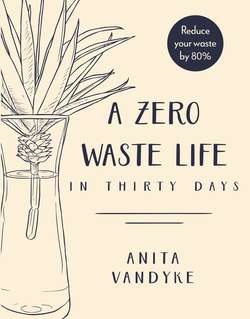Читать книгу A Zero Waste Life - Anita Vandyke - Страница 6
Оглавлениеintroduction
This book is a practical guide designed to help you reduce your waste by 80% in thirty days. It’s also a reflection on how I became an accidental environmentalist. It tells the story of how I went from being a maximalist to a minimalist, from “hero” to zero—to living a “zero waste” life.
I didn’t grow up with a hippie mother or a passion for the environment, I was just a person trying to find happiness in all the usual places—money, power and status. But this triumvirate of success didn’t provide me with the happiness that I expected. I was wasting my life.
But how did this journey all begin? What is living a zero waste life? I’ll start from the beginning. My “aha moment” as Oprah calls it.
It all started with a simple no. Standing at the supermarket checkout, the cashier looked at me and asked, “Would you like a plastic bag for that? It’ll be an extra 15 cents.” A plastic bag for 15 cents? Sounded like extortion to me. I had just quit my job the previous day and I needed to make ends meet on one income. That first no, based on economics rather than environmentalism, was over two years ago, and since that day I’ve said no to plastic bags over a thousand times. I’ve also said no to disposable coffee cups, fast fashion and excess consumerism. And in saying no to all this, I’ve actually said yes to a whole new life. That first no led me to a zero waste life.
How did I end up here? I thought, while crying at a dining table surrounded by my mother-in-law’s Royal Doulton porcelain figurines. It had been another terrible day at work and I’d come home to an evening sorting the many boxes of stuff we’d brought with us to my in-laws” house, where we had recently moved in an attempt to pay off our debt. The dam had burst and I didn’t know how to stop. All I could think was how did I end up like this?
On paper my life was the epitome of success. I was the one my parents didn’t have to worry about: the daughter who graduated high school with a near perfect UAI (the Australian equivalent of the GPA), had a well-paying corporate job and the latest Givenchy boots in my closet. It was a supposedly picture-perfect life.
My parents brought me up believing that money was essential to happiness. Poor immigrant workers who never had any money, they saw it as the solution to all their problems. So I did what many a good, first-born daughter of a Chinese-migrant family has done and worked hard, got good grades and then a high-paying job. I climbed the corporate ladder, foregoing my passions, hobbies and creativity to chase the Great Australian (and American) Dream.
By age twenty-six I was a manager in a large engineering firm, earning more money than my parents ever had. The day of the “broken dam fiasco” was just another day at the office. I remember sitting in that Board Meeting on Level 6, looking at my boss, my boss’s boss and the big boss, thinking, Is this it? Is this who I will become in five, ten, fifteen years’ time? I realised then that if I kept going down this path, all my hopes of living a life that was truly mine, one that wasn’t bound by golden handcuffs, would be lost forever.
